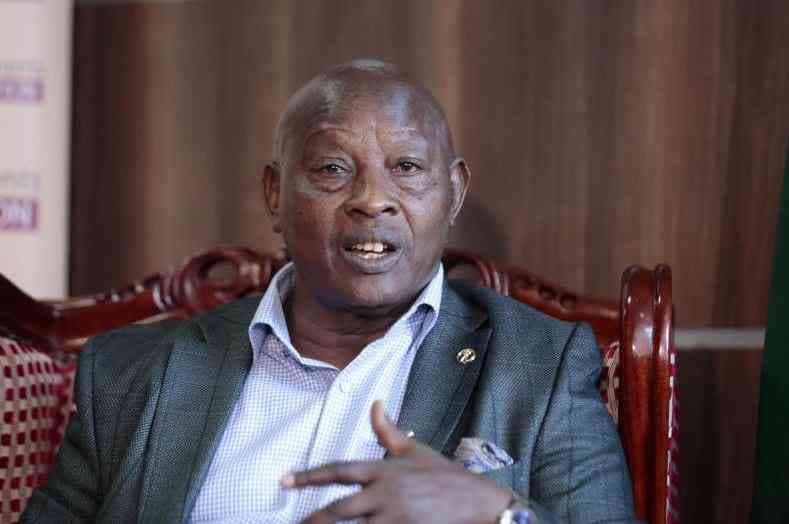We're loading the full news article for you. This includes the article content, images, author information, and related articles.
A High Court petition seeks Nyeri Governor Mutahi Kahiga's removal from office for alleged hate speech, testing Kenya's constitutional safeguards on leadership and national cohesion after divisive remarks.

NAIROBI - Nyeri Governor Mutahi Kahiga is facing a legal challenge to his leadership after a petition was filed at the High Court seeking his removal from office over allegations of hate speech and gross misconduct. The suit, lodged on Wednesday, October 29, 2025, by members of the Bunge la Mwananchi civil society group, argues that the governor's recent public utterances threaten national unity and violate constitutional principles of leadership and integrity.
The petitioners—Lawrence Oyugi, Komeade Bush, and Nicholas Kimanzi—are asking the court to declare Governor Kahiga unfit to hold public office. They are also seeking interim orders to suspend him from his duties pending the case's determination, arguing his position gives him a platform to amplify divisive rhetoric.
The petition centers on comments Governor Kahiga made in the Kikuyu language at a funeral in Kieni Constituency, Nyeri County, following the death of former Prime Minister Raila Odinga on October 15, 2025. In a video that circulated widely, Kahiga suggested Mr. Odinga's death was a form of divine intervention that shifted the country's political landscape and development priorities away from the Nyanza region in favor of the Mt. Kenya region.
He was quoted as saying, “All goodies were being directed there… but who is God, does he take Ugali at somebody's house or sleep in Kayole?” The petitioners contend this statement, particularly the reference to "Kayole," was a coded and derogatory insult aimed at the Luo community, amounting to mockery and incitement. The remarks were widely interpreted as celebrating the death of a national leader for political gain.
The governor's comments triggered immediate and widespread condemnation from across the political spectrum. The Council of Governors (CoG) convened an extraordinary meeting on October 22, 2025, and publicly distanced itself from the remarks, describing them as “reckless, insensitive, sad and unfortunate.” Following the outcry, Governor Kahiga resigned from his position as the Vice-Chairperson of the CoG and issued a public apology, stating his words were misunderstood and taken out of context.
Leaders from both the government and the opposition condemned the speech. Homa Bay Governor Gladys Wanga, who is also the ODM Chairperson, termed the remarks a “new low” and an exhibition of “false allegations, personal insults, fear-mongering and ethnic profiling.” Mathira MP Eric Wamumbi, from Kahiga's own county, called for his immediate impeachment by the Nyeri County Assembly to prevent one person's recklessness from alienating the region. Protests also erupted in Nyeri town, with residents demanding accountability and urging their Members of County Assembly (MCAs) to initiate impeachment proceedings.
The National Cohesion and Integration Commission (NCIC) also summoned the governor to account for his statements.
The petitioners argue that Governor Kahiga's actions constitute a serious violation of the Constitution of Kenya. They cite several articles, including Article 10 on national values and principles of governance, Article 27 on equality and freedom from discrimination, and Articles 73 and 75, which outline the responsibilities of leadership and integrity for state officers. By allegedly promoting division and ethnic hostility, the petition claims the governor breached his oath of office.
The legal process for removing a county governor is stipulated under Article 181 of the Constitution and the County Governments Act. It requires grounds such as gross violation of the Constitution, abuse of office, or gross misconduct. The process typically begins with a motion supported by at least two-thirds of the Members of the County Assembly (MCAs). If passed, the matter moves to the Senate for investigation and a final vote.
In this instance, the petitioners have opted for a court process to declare the governor unfit for office, a parallel route that tests the judiciary's role in upholding Chapter Six of the Constitution on Leadership and Integrity. The petitioners have also asked the court to compel the Director of Public Prosecutions (DPP) and the Ethics and Anti-Corruption Commission (EACC) to investigate and take legal action against the governor. The case's outcome could set a significant precedent for holding public officials accountable for hate speech and divisive conduct in Kenya.
Keep the conversation in one place—threads here stay linked to the story and in the forums.
Sign in to start a discussion
Start a conversation about this story and keep it linked here.
Other hot threads
E-sports and Gaming Community in Kenya
Active 9 months ago
The Role of Technology in Modern Agriculture (AgriTech)
Active 9 months ago
Popular Recreational Activities Across Counties
Active 9 months ago
Investing in Youth Sports Development Programs
Active 9 months ago
Key figures and persons of interest featured in this article